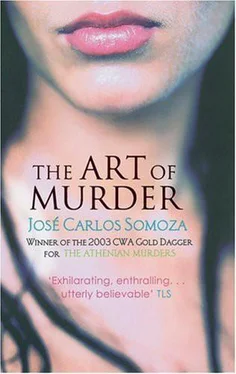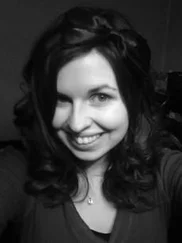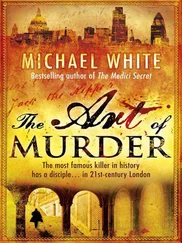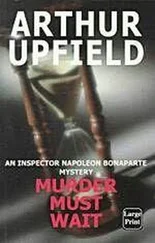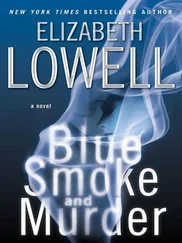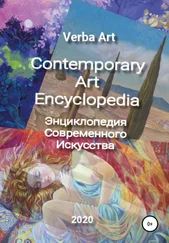Jose Somoza - Art of Murder
Здесь есть возможность читать онлайн «Jose Somoza - Art of Murder» весь текст электронной книги совершенно бесплатно (целиком полную версию без сокращений). В некоторых случаях можно слушать аудио, скачать через торрент в формате fb2 и присутствует краткое содержание. Жанр: Триллер, на английском языке. Описание произведения, (предисловие) а так же отзывы посетителей доступны на портале библиотеки ЛибКат.
- Название:Art of Murder
- Автор:
- Жанр:
- Год:неизвестен
- ISBN:нет данных
- Рейтинг книги:4 / 5. Голосов: 1
-
Избранное:Добавить в избранное
- Отзывы:
-
Ваша оценка:
- 80
- 1
- 2
- 3
- 4
- 5
Art of Murder: краткое содержание, описание и аннотация
Предлагаем к чтению аннотацию, описание, краткое содержание или предисловие (зависит от того, что написал сам автор книги «Art of Murder»). Если вы не нашли необходимую информацию о книге — напишите в комментариях, мы постараемся отыскать её.
Art of Murder — читать онлайн бесплатно полную книгу (весь текст) целиком
Ниже представлен текст книги, разбитый по страницам. Система сохранения места последней прочитанной страницы, позволяет с удобством читать онлайн бесплатно книгу «Art of Murder», без необходимости каждый раз заново искать на чём Вы остановились. Поставьте закладку, и сможете в любой момент перейти на страницу, на которой закончили чтение.
Интервал:
Закладка:
The Plastic Bos spread like a puddle of water in the midst of the small pine wood. Twenty metres long and six metres wide, it was marked out by eleven fake trees which differed from the real ones because they were prettier and because their leaves made a sound like hail when the wind rose. Clara did not object to the plastic wood. To her it seemed to go with the rest of Holland, the country of landscapes by Vermeer and Rembrandt; of towns for elves like Madurodam, with tiny houses, canals, churches and monuments all built to scale; of dykes and polders where land has been created by the human will in its eternal struggle with the sea. She stood on the soft silicone grass carpet, next to one of the trees. The sun shone straight into her eyes, but she tried not to blink.
She wanted to have her eyes wide open, because Van Tysch was only three metres away from her.
'Do you like Rembrandt?' was the first thing he said, in fluent Spanish.
His voice was deep, majestic. In the theatre of ancient Greece, voices like his represented Zeus.
‘I don't know his painting very well,' Clara replied. It was hard to get her yellow, primed tongue around the words. Van Tysch repeated the question. It was obvious her reply had not satisfied him. Clara looked inside herself, and spoke with complete sincerity.
'No,' she said. "The truth is, I don't like him.' 'Why?' 'I don't know. But I don't like him.'
'Nor do I,' the painter unexpectedly said. 'That's why I never get tired of looking at his paintings. We have to confront what we don't like time and again. His painting is like a trusted friend: it offends us because it tells us the truth.'
His voice sounded weak and tired. Clara thought he must be an immensely sad man.
'I'd never thought of it like that,' she murmured. 'That's a very interesting way of looking at it.'
Then she thought Van Tysch had no need of any praise from her, and bit her lip.
'Is your father dead?' he asked all of a sudden. 'Pardon?'
He repeated the question. At first it seemed strange to Clara that Van Tysch should change the subject so abruptly. But she was not in the least surprised that he knew details of her life. She imagined the Maestro must investigate all the canvases he took on.
'Yes,' she replied. 'Why do you get so frightened at night?' 'What?'
'When my assistants woke you up by making a noise outside your window. Why did you look so terrified?' 'I don't know. I was frightened.' 'Of what?'
'I don't know. I've always been afraid of someone breaking into my house at night.'
Van Tysch came up to her, took hold of her chin, and tilted it as if he were examining a jewel in the light. Then he stepped back again, leaving her head leaning over to the right. The sun's rays were garlanding the tree branches. The atmosphere in the plastic wood was damp, like a prism, so that the sunlight refracted in drops of pure colour.
She thought he was studying her pose, but she could not be sure. 'My mother was Spanish,' was his next comment.
These brusque changes of topic were apparently normal in any dialogue with him. They did not bother Clara. 'Yes, I know,' she said. 'And you speak very good Spanish.'
Once again she realised how stupid her praise must sound. But Van Tysch went on as if he had not heard her:
‘I never knew her. When she died, my father tore up all her photos, so I never even saw her. Or rather, I only saw her in the drawings he made of her. They were watercolours. My father was a good painter. So I saw my mother for the first time thanks to his paintings, which means I'm not sure he didn't make her more beautiful than in real life. And to me she looked very, very, very beautiful.' He had pronounced the three 'verys' slowly, making a different sound each time, as if trying to discover hidden meanings in the word by pronouncing it differently each time. 'But perhaps it was all due to my father's art. I've no idea whether the watercolours were better or worse than the original, I've never known or had any wish to know. I did not know my mother, and that's that. Later on I came to understand that is normal. I mean it's normal not to know.'
He paused and came up to her again. He moved Clara's head in the opposite direction, but then appeared to change his mind and pushed it back to the original position. He stepped away, then drew near again. He put a hand on the back of her head and bent it forwards. He put on the reading glasses hanging round his neck and studied something. Then he took off his glasses and walked away once more. 'Your father must have died young, too,' he said. 'My father?' 'Yes, your father.'
'He died at the age of forty-two of a brain tumour. I was nine at the time.'
'So you didn't know him either. You've seen images of him, but you never really knew him.'
‘Yes, I did a little. By the age of nine I already had some idea about him.'
'We always have some idea about things we don't know,' Van Tysch replied, 'but that doesn't mean we know them any better.
You and I don't know each other, but we have already formed an idea of one another. And you don't know yourself, but you've already formed an idea about yourself.' Clara nodded. Van Tysch went on.
'Nothing around us, nothing we know or do not know, is either completely known or unknown. It's so easy to invent extremes. It's the same with light. Did you know there's no such thing as total darkness, even for a blind person? Darkness is full of presences: shapes, smells, thoughts… And take a look at this summer evening light. Would you say it was pure? Take a good look. I'm not just talking about the shadows. Look between the cracks of the light. Can you see the tiny specks of darkness? Light is embroidered on a very dark canvas, but that's hard to see. We have to mature. As we do so, we come to understand that truth is an intermediate point. It's as if our eyes accustomed us to life. We understand that day and night, and life and death, too, perhaps, are merely different points in the play of light and shade. We discover that truth, the only truth worthy of the name, is shade.'
After a pause, as though he had been thinking about what he had just said, he repeated:
'The only truth is shade. That's why everything is so terrible. That's why life is so unbearable and terrible. That's why everything is so dreadful.'
Clara could not hear any emotion in his words. It was as if he were talking aloud as he worked. Van Tysch's mind was spinning in a void. 'Take off your robe.' 'Yes.' As she was doing so, he asked her: 'What did you feel when your father died?'
Clara was folding her robe over a tree branch. The air enfolded her naked, primed body like a caress of pure water. The question brought her to a halt. She looked at Van Tysch: 'What did I feel when my father died?' 'Yes. What did you feel?'
'Not a lot. I mean… I don't think I felt it as badly as my mother and brother. They knew him better, so it was worse for them.' 'Did you see him die?'
‘No. He died in hospital. He was at home when he had a crisis, a fit. He was taken to hospital, and I wasn't allowed to see him.'
Van Tysch went on staring at her. The sun had moved round and lit part of his face. 'Have you dreamed of him since?' 'Occasionally' 'What sort of dreams?'
‘I dream of… of his face. His face appears, he says strange things to me, then he disappears.'
A bird sang and then fell silent. Van Tysch screwed up his eyes to look at her.
'Walk over there,' he said. He pointed towards the shade under a fake tree.
The plastic grass bent docilely under her bare feet. Van Tysch raised his right arm. There is fine.'
She stopped. Van Tysch had put his glasses on again, and was coming over. He had not touched her: all he had done was to outline her with his curt orders, but already she felt changed, as if her body were different, better drawn than ever before. She was convinced her body would do whatever he asked of it without waiting for her brain to agree. And she was determined she would lay her mind at his feet as well. All of it. Completely. Whatever he said, whatever he wished. Without limit. 'What happened?' Van Tysch asked. 'When?' 'Just now.' 'Now?'
Читать дальшеИнтервал:
Закладка:
Похожие книги на «Art of Murder»
Представляем Вашему вниманию похожие книги на «Art of Murder» списком для выбора. Мы отобрали схожую по названию и смыслу литературу в надежде предоставить читателям больше вариантов отыскать новые, интересные, ещё непрочитанные произведения.
Обсуждение, отзывы о книге «Art of Murder» и просто собственные мнения читателей. Оставьте ваши комментарии, напишите, что Вы думаете о произведении, его смысле или главных героях. Укажите что конкретно понравилось, а что нет, и почему Вы так считаете.
